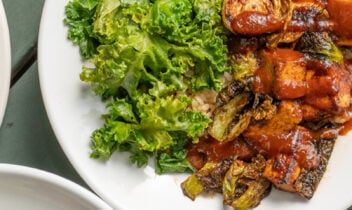Performance Nutrition: Bananas, Cramps and the Real Deal on Hydration and Electrolytes
Electrolytes, namely potassium and sodium, as well as hydration are associated with the prevention of exercise-associated muscle cramps (EAMC); the painful, involuntary, muscle spasms that can end a race or workout. The exact cause of EAMC is still unknown. However, recent studies are finding little reason to believe the usual suspects are to blame; bananas for potassium, salt tablets for sodium, and adequate hydration will not prevent muscle cramping.
Wait … bananas don’t stop muscle cramps?
Unfortunately, bananas aren’t the solution to world peace, money troubles, or painful muscle cramps! New research is peeling back the dogma surrounding the role electrolytes and hydration have in EAMC.
The connection between hydration, electrolytes and sweating … to muscle cramps was made over 100 years ago. Miners and steamship workers performing physical labor who got cramps in hot, humid conditions were seen sweating profusely. Despite this long history of “guilty by association,” no evidence in the way of scientific studies exists to prove electrolytes or hydration has any impact on muscle cramps during exercise. Take a look …
The Studies
- In 2005 a study on Ironman triathletes was done. The results: no clinically significant differences in electrolyte levels or hydration between crampers and non-crampers.1
- In 2013, 10 subjects were dehydrated to 5% body mass (considered serious dehydration) and performed controlled exercise. The result was no greater likelihood of cramping.2
- 210 Ironman triathletes took part in a study published in 2011. The two identified risk factors for muscle cramps: faster race times and previous history of cramping. No association of electrolytes or hydration was made between those who cramped and those who didn’t.3
Additionally, low levels of an electrolyte (magnesium, calcium, potassium, sodium, chloride) are associated with generalized muscle cramping; any muscle, anywhere, and at rest. Evidence shows muscle cramps from exercise are isolated to the muscles doing work.
So, what does cause muscle cramps?
Higher intensity efforts (going all out on race day), muscle fatigue, and a history of cramping are being reported as the root causes of muscle cramps in triathletes and marathon runners. All of which point to a neuromuscular component.4
If bananas, good hydration, sodium tablets, and electrolyte powders won’t prevent cramping, what does?
Because the root cause of EMAC is still unknown the solutions aren’t either. Some things being considered are threshold training, climate acclimation, and correcting muscle imbalances, to reduce the occurrence of cramping.
However, the importance of hydration and electrolytes in health, sport safety, and performance is no less important. Dehydration and electrolyte loss are causes for poor performance, serious illness and even death. A good hydration and electrolyte strategy should be developed with the assistance of a registered dietitian (RDN) or Certified Specialist in Sports Dietetics (CSSD).
But keep eating those bananas!
Fruits and vegetables can help with hydration [a banana is 74% water!] and provide healthful nutrients such as vitamins, minerals, fiber and protein. So for elite athletes – or those just trying to stay fit – a diet with plenty of fruits and vegetables, including bananas, is important for performing at your best!
References
1 Sulzer NU, Schwellnus MP, Noakes TD. “Serum electrolytes in Ironman triathletes with exercise-associated muscle cramping.” Med Sci Sports Exerc. 2005;37(7):1081-5.
2 Braulick KW, Miller KC, Albrecht JM, et al. “Significant and serious dehydration does not affect skeletal muscle cramp threshold frequency.” Br J Sports Med. 2013;47(11):710-4.
3 Schwellnus MP, Drew N, Collins M. “Increased running speed and previous cramps rather than dehydration or serum sodium changes predict exercise-associated muscle cramping: a prospective cohort study in 210 Ironman triathletes.” Br J Sports Med. 2011;45(8):650-6.
4 Schwellnus MP. “Cause of exercise associated muscle cramps (EAMC)–altered neuromuscular control, dehydration or electrolyte depletion?” Br J Sports Med. 2009;43(6):401-8.
5 Murray D, Miller KC, Edwards JE. “Does a Reduction in Serum Sodium Concentration or Serum Potassium Concentration Increase the Prevalence of Exercise-Associated Muscle Cramps?” J Sport Rehabil. 2015.


